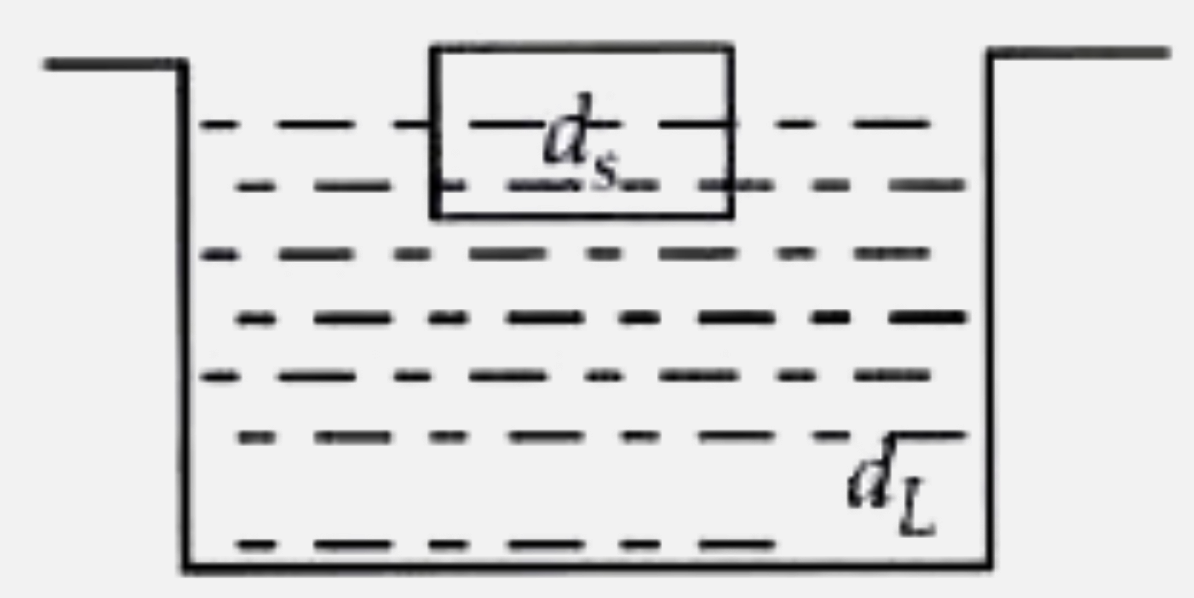A body weighs 550 gf in air and 370 gf in water when it is completely immersed in water. Find the volume of the body. (density of water = 1 g cm−3 )
To solve the problem step by step, we will follow the principles of buoyancy and Archimedes' principle.
1. Identify the Given Values:
- Weight of the body in air (W1) = 550 gf
- Weight of the body in water (W2) = 370 gf
2. Calculate the Upthrust (Buoyant Force):
- The upthrust (or buoyant force) can be calculated using the difference between the weight of the body in air and in water:
Upthrust=W1−W2=550gf−370gf=180gf
3. Apply Archimedes' Principle:
- According to Archimedes' principle, the upthrust is equal to the weight of the water displaced by the body. This can be expressed as:
Upthrust=V⋅ρ⋅g
Where:
- V = Volume of the body (in cm³)
- ρ = Density of water (1 g/cm³)
- g = Acceleration due to gravity (980 cm/s² in CGS units)
4. Set Up the Equation:
- Substitute the known values into the equation:
180gf=V⋅(1g/cm3)⋅(980cm/s2)
5. Solve for Volume (V):
- Rearranging the equation to find V:
V=180gf980cm/s2
- Since 1 gf is equivalent to 1 g under standard gravity, we can simplify:
V=180g980cm/s2
- This simplifies to:
V=180980cm3
- Calculating this gives:
V=180cm3
6. Conclusion:
- The volume of the body is 180cm3.
Final Answer:
The volume of the body is 180 cm³.
- Weight of the body in air (W1) = 550 gf
- Weight of the body in water (W2) = 370 gf
- The upthrust (or buoyant force) can be calculated using the difference between the weight of the body in air and in water:
Upthrust=W1−W2=550gf−370gf=180gf
- According to Archimedes' principle, the upthrust is equal to the weight of the water displaced by the body. This can be expressed as:
Upthrust=V⋅ρ⋅g
Where:
- V = Volume of the body (in cm³)
- ρ = Density of water (1 g/cm³)
- g = Acceleration due to gravity (980 cm/s² in CGS units)
- Substitute the known values into the equation:
180gf=V⋅(1g/cm3)⋅(980cm/s2)
- Rearranging the equation to find V:
V=180gf980cm/s2
- Since 1 gf is equivalent to 1 g under standard gravity, we can simplify:
V=180g980cm/s2
- This simplifies to:
V=180980cm3
- Calculating this gives:
V=180cm3
- The volume of the body is 180cm3.
The volume of the body is 180 cm³.
Topper's Solved these Questions
- ICSE ANNUAL EXAMINATION -2020BOOK - ICSECHAPTER - ICSE ANNUAL EXAMINATION -2020EXERCISE - SECTION-II
45 Videos
- HEAT AND ENERGYBOOK - ICSECHAPTER - HEAT AND ENERGYEXERCISE - EXERCISE -6(D) Multiple Choice Question)
4 Videos
- LAWS OF MOTIONBOOK - ICSECHAPTER - LAWS OF MOTIONEXERCISE - EXERCISE - 3(E) (Numericals)
31 Videos
Similar Questions
A body weighs 550 gf in air and 370 gf in water when it is completely immersed in water. Find the upthrust on the body.
View SolutionA body weighs 450 gf in air and 310 gf when completely immersed in water. Find:
(i) the volume of the body
(ii) the loss in weight of the body, and
(iii) the upthrust on the body. State the assumption made in part (i)
View SolutionA body weighs W gf in air and W1 gf when it is completely immersed in water. Find (i) volume of the body (ii) upthrust on the body. (iii) relative density of material of the body.
View SolutionA solid weighs 120 gf in air and 105 gf when it is completely immersed in water. Calculate the relative density of solid.
View SolutionA solid weighs 32 gf in air and 28.8 gf in water.
Find R.D. of solid
View SolutionA body weighs 200 gf in air and 190 gf when completely immersed in water. Calculate:
(i) the loss in weight of the body in water.
(ii) the upthrust on the body.
View SolutionA solid weighs 32 gf in air and 28.8 gf in water.
Find the volume of solid
View SolutionA metal piece weighs 200gf in air and 150 gf when completely immersed in water.
Calculate the relative density of the metal piece.
View SolutionA Solid weighs 50 gf in air and 44 gf when completely immersed in water. Calculate:
(i) the upthrust,
(ii) the volume of the solid, and
(iii) the relative density of the solid.
View Solution
The figure above shows a solid of density dS floating in a liquid of density dL.
The same solid floats in water with 3th5 of its volume immersed in it. Calculate the density of the solid. (density of water = 1 g cm−3 )
View Solution
